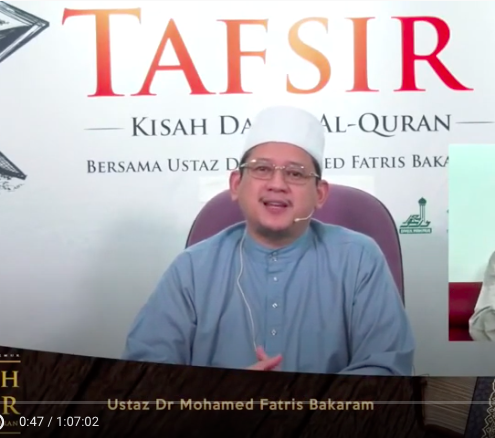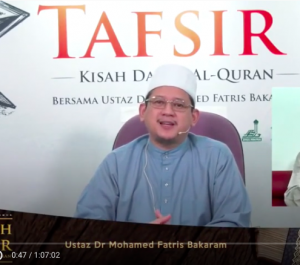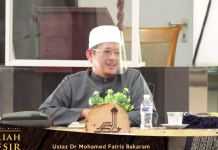This article is a summary of takeaways from Ustaz Dr Mohamed Fatris Bakaram’s Tafsir Online Lecture on 5th July 2020. Summaries of previous lectures on Surah Maryam and Surah Taha can be found here. This lecture is a continuation of the previous lecture after Surah Al Anbiya’ verses 92 to 98.
إِنَّ هَٰذِهِ أُمَّتُكُمْ أُمَّةً وَاحِدَةً
Indeed this, your Ummah, is one Ummah, [21:92]
One Ummah
Allah SWT informs us in this verse that this Ummah, or group of people, is one that belongs to “you”. The suffix “kum” used here indicates a plural ‘you’. To know who Allah SWT is referring to when He says “you”, we need to look at the previous verses. If you remember, the previous verses contained stories of various prophets of Allah and their people across time. In this verse, Allah SWT is saying, “O Prophets, even though you come from vastly different eras and had vastly different people who came from vastly different places, all of your people are a single Ummah, a single people.
This is because all of them had been instructed to obey a Single God. All the prophets had been sent with the same single message. What was different was in the method of executing the law based on each people (i.e. different way of performing prayers, different practices etc.). The core message was identical. So, each Ummah was different, but they were bound together as one single Ummah.
In fact, for the same wrongdoing, they were similarly punished. Prophet Lut people and Prophet Nuh AS’ people were both destroyed through Allah’s punishment. Even though the punishments differed in their form, they had the same root cause – disobedience and disbelief in Allah SWT. Allah SWT sends this verse as a form of emphasis, telling us, the Ummah of Prophet Muhammad SAW, that if we reject the teachings of Rasulullah SAW, we will also be inflicted with the same displeasure of Allah SWT. We too are entitled to the same punishment by Allah SWT if Allah wills it, and we too are entitled to forgiveness if that is what Allah SWT wills for us, just as Allah SWT has similarly given His forgiveness to certain groups of people of the past.
There is an alternative translation for this verse. Some scholars hold the opinion that “Ummah” does not refer to ‘group of people’, instead, it translates to ‘religion’. So, in this case, this verse would be translated into: “This religion (that has been brought to you by all of these Prophets) is a single religion.”.
وَأَنَا رَبُّكُمْ فَاعْبُدُونِ
and I am your Lord, so worship Me. [21:92]
This religion teaches us to bow down in service of the One true God, Allah SWT. Regardless of which people you belong to, or which era you existed, or which prophet came to you, Allah SWT is your Only God, and only He is deserving of your worship.
وَتَقَطَّعُوا أَمْرَهُم بَيْنَهُمْ ۖ
But they have divided their affair among themselves, [21:93]
Different Beliefs
The problem though, is that every human being chooses their own direction. Just as they may look different, have different cuisines, languages, and cultures, they also make different choices. Some people accept Allah as One God, others choose to reject the existence of God. Some declare that Allah is worthy of worship and stay firm in worshipping Him, others acknowledge He is God but choose not to practice His Laws. Some people claim that they accept Allah as God, but their hearts are filled with disbelief – these are the hypocrites, we have previously spoken of them. Some people are born in disbelief or choose to disbelief but then find themselves seeking the truth and are given guidance by Allah SWT; the inverse also happens.
So, Allah SWT is telling us that we are varied even though we have a single God and a single religion. When people choose different paths, some people make edits to the teachings of their prophet, some make adjustments to their original text, some receive what is taught by their prophet and then append their own stories, assumptions and messages into it. This is what Allah SWT refers to in verse 93; a single religion has been revealed to the people, and it is they who have split it up into many multiple religions.
We have heard about the Arabs of Quraish. We know about their ignorant practices and disbelief. But if you look closely, you will realise that their practices did not come out of nowhere. They still held on loosely to the religious heritage of their forefathers, Prophet Ibrahim and Prophet Ismail AS. That is why you hear about people of that time who did not worship the idols; they held on firmly to the Aqidah or belief system of Prophet Ibrahim AS. They were people called “Al-Hanif”, they chose to worship only One God. One such person was Abdul Muttalib, the paternal grandfather of Prophet Muhammad SAW. He never worshipped idols because he held on to Prophet Ibrahim’s belief of one God. He did not however practice any of the practices of worship that Prophet Ibrahim carried out, he just had that faith in his heart.
There were people who believed in Allah as the “main God”, however they believed that in order to reach Allah SWT, they needed mediators – this is where the idols came in. There were people who completely rejected the existence of Allah SWT, so the idols were their sole object of worship. So, from the single faith of Prophet Ibrahim AS, over time and generations, the faith split into different variations of belief and practice. This is what is referred to by Allah SWT in verse 93.
Many Religions Bound as One
So, the religion of Prophet Musa As, revealed in the Taurat was pulled aside by its people who say, “This is our religion, this is what it is called.”. The religion of Prophet Isa AS, revealed in the Injeel, was pulled to another direction by its people, who claim that, “This is our religion, it is unlike yours.”. So, the followers of Prophet Musa AS and the followers of Prophet Isa AS now consider themselves as following two different religions, even though the source was the same message of the same faith. Both the Books were messages revealed by Allah SWT. Over time and generation, the messages were tweaked and shifted until they became unique and separate from one another.
كُلٌّ إِلَيْنَا رَاجِعُونَ
[but] all to Us will return. [21:93]
Allah SWT then reminds us that whichever our choice of belief may be, at the end of the day, all of us will return to Him SWT. So regardless of whether you belief that God exists, or you think that there is no god, whether you think that God needs mediators or that God can have a child or that there are multiple gods even… whatever your belief system may be, in the end, it doesn’t matter what you belief is because the truth is that you will all return to Allah SWT, the only true God.
فَمَن يَعْمَلْ مِنَ الصَّالِحَاتِ وَهُوَ مُؤْمِنٌ فَلَا كُفْرَانَ لِسَعْيِهِ وَإِنَّا لَهُ كَاتِبُونَ
So whoever does deeds of righteousness, and he is a believer, then whatever they have done will not be denied; and surely We write it down for him. [21:94]
Allah’s Promise
Allah SWT assures us in this verse that no good deed done for His sake will be denied or rejected. They will all be accepted by Him SWT. When Allah SWT accepts these deeds, it means that Allah SWT will reward them in the manner that they deserve. This is Allah’s promise.
As human beings, when we make promises, it becomes an obligation for us to fulfil what we have said we would do. If we choose not to fulfil our promise, the other party has a right to act against us. This is what happens between people. When an agreement is written and signed, a contract and promise is established. When one party breaks the agreement, the other party may not have the power to retaliate or force the perpetrator to deliver on his promise. However, he can bring this broken agreement up to a higher authority; he could take legal action against the perpetrator for example. Justice will be served to ensure that there will be consequences to bear for whoever does not fulfil their end of the bargain.
When it comes to Allah SWT’s promise though, there is no higher authority that can ensure that Allah SWT fulfils His end of the bargain. He promises us that our good deeds will be accepted and rewarded, but if He were to fail to do so, there is no one who can take action against Him. Yet, it is impossible for Allah SWT to go against His promise. Not because He SWT fears repercussions by another authority for not fulfilling His promise, but because He places it upon Himself that He will never break His Word.
And it is not within the Perfection of Allah SWT to be someone who does not deliver what He promises. As believers, we hold strongly onto this. Do not ever doubt His Words. Do not say, “I mean… even if I do all of these good deeds, we don’t know for sure if Allah will compensate me for them anyway.”. It is impossible for Allah SWT to go back on His word, so trust Him SWT to deliver.
Allah SWT has all your deeds in a record, nothing will slip His judgement. Your lies and stories will not hold any account because He has your life recorded, every moment, every action, at whatever the time of the day with whoever you may be with. Allah SWT will look at these records and He will make His decision out of His Mercy and His Justice. Allah will determine our reward and punishment, and He will never be unjust to His servants, whoever they may be.
Lessons from the Past
So, when we read the stories of the prophets of the past, it is not for us to shake our heads disapprovingly at their people. The point of learning these stories is for us to have a look within ourselves and reflect on our own actions. These people’s lives are now all in the past, there is no changing their history. However, we learn their stories at present, not so we can mock or criticise them but, so that we may look at the lessons on ourselves.
After all, Allah SWT has told us that we are in fact a single Ummah right? So just as Allah SWT had wanted them to do good, Allah SWT also wants us to do good. Just as Allah SWT had requested their obedience, so too does Allah SWT request our obedience. Just as Allah SWT promise them Paradise for their righteousness, so too will Allah grant us Paradise for our righteousness. And just as the people of the past got punishment for their disobedience, so too will we receive punishment should we fall into disobedience.
Allah SWT assures us, that for as long as we do good deeds and we remain as believers, then Allah SWT will not deny us our reward. The evidence is that it is all written in His records SWT.
No Return
وَحَرَامٌ عَلَىٰ قَرْيَةٍ أَهْلَكْنَاهَا أَنَّهُمْ لَا يَرْجِعُونَ
And it is prohibited for any community which We have destroyed: that they shall not return. [21:95]
Allah SWT is saying that the people of the destroyed communities of Prophets of the past will be forbidden from returning to the world to make amends for what they have done. There will never be a second chance for them. The opportunities only exist for as long as death has not yet come. For as long as death has arrived, there is no changing of your outcome. It is not as though no warning had been given, the prophets had taught and preached and given advice, warning and guidance for years – for centuries even in the case of Prophet Nuh AS – and yet they were rejected. Once Allah SWT’s punishment has come, there is no way out to redeem yourselves. There is no one to blame but yourselves.
The End of Time
This whole chapter summarises the history of humankind, from the time of Prophet Adam AS all the way to the present, for us, the Ummah of Rasulullah SAW. We do not know how long-ago Prophet Adam AS lived. We do not know until when humankind will live. What we do know is that human life will end someday and when the day is coming, there will be certain signs that will warn us of the end of times. These signs will serve as reminders for us to take heed. Amongst the signs are mentioned here.
حَتَّىٰ إِذَا فُتِحَتْ يَأْجُوجُ وَمَأْجُوجُ وَهُم مِّن كُلِّ حَدَبٍ يَنسِلُونَ
Until, when Ya’juj and Ma’juj are let loose (from their barrier), and they will swiftly descend from high places. [21:96]
My dearest brothers and sisters, the story of Ya’juj and Ma’juj has been discussed in detail in our Tafsir lecture when we went through Surah Al-Kahf in October last year. If you still remember, after we talked about the story of Prophet Musa and Khidir AS. And then we talked about a righteous man called Zhulkarnain. Zhulkarnain had come across a group of people who were not effective in communication, they did not seem to have a good grasp of language.
They had approached Zhulkarnain and asked him for help with Ya’juj and Ma’juj who caused mass destruction wherever they went. They requested his help in trapping them both behind a wall. So, we have heard about them. In Surah Al-Anbiya’ we hear about them briefly as signs of the end of times.
When the time for the Day of Judgement nears us, Ya’juj and Ma’juj will be released when the wall that is holding them back will crumble like dirt. Amongst the other signs of the Day of Judgement, are that Imam Mahdi and Prophet Isa AS will come, Dajjal will appear and so on so forth. Some people have asked if these signs are already here. We say that there are various opinions on this issue. In fact, when it comes to the topic of Ya’juj and Ma’juj, the scholars themselves vary in opinion regarding what Ya’juj and Ma’juj are. Are they human beings? Are they giants or dwarves? Some scholars say that they are descendants of the Tatars and Mongols. Allah knows best who they are.
Do not busy yourselves with finding out the reality of Ya’juj and Ma’juj. When it came to Rasulullah SAW himself, there was little evidence from Hadith regarding them. If you think about it, would it not have been important for the Prophet SAW to inform us of the exact whereabouts of Ya’juj and Ma’juj so that we may take precaution from them? As a leader, wouldn’t you have wanted your people to know the truth so that they may stay away from destruction? The reality is that Prophet Muhammad SAW had never said anything.
There has to be wisdom behind Allah SWT making the truth regarding Ya’juj and Ma’juj a secret. It is only by Allah’s Will that they will be exposed and if Allah SWT wills for them to escape, then nothing can stop them from reappearing. We study the Qur’an in order to derive lessons from it not to preoccupy ourselves with specific details from the past. Do not go searching for where Prophet Nuh’s Ark was, for example. Take heed from his story even without knowing all of the small details.
We may not even be around to experience these big signs of the coming of the Day of Judgement. We may never see the arrival of Imam Mahdi or Dajjal, but our own small Qiyamah are coming to each one of us for sure. Each of us will meet our own deaths and it is crucial that we are prepared for its coming.
The End Has Drawn Near
وَاقْتَرَبَ الْوَعْدُ الْحَقُّ
And the True Promise has drawn near; [21:97]
The past tense is used for the word “waqtaraba” meaning ‘to have drawn near’. The coming of the last prophet, Prophet Muhammad SAW was a clear sign that the Day of Judgement is coming soon. The exact date of it is not something we will know, that is something that remains a secret with Allah SWT.
Whenever we have something that we do not know when the time of arrival will be, then verily we know that the time of arrival is very soon. For example, if I were to know that I would die in the year 2050, then I can say that, “oh, I still have a long way to go! There’s still 30 years to prepare.” Even if we were to get a WhatsApp message from an angel saying that our time of death is this coming Friday, and today is a Sunday, we would be able to do all sorts of things to prepare for its’ coming. However, when we know that something is coming, but we do not know when it will come, then we know that our time is short. Death could come in 30 years or it could come within the next 30 minutes. We need to be prepared all the time.
The End of the Disbelievers
فَإِذَا هِيَ شَاخِصَةٌ أَبْصَارُ الَّذِينَ كَفَرُوا يَا وَيْلَنَا قَدْ كُنَّا فِي غَفْلَةٍ مِّنْ هَٰذَا بَلْ كُنَّا ظَالِمِينَ
Then suddenly the eyes of those who disbelieved will be widened [in horror, while they say], “O woe to us; we had been unmindful of this; rather, we were wrongdoers.” [21:97]
The eyes of the disbelievers are said to be widened. When people’s eyes widen, it is often due to shock, surprise, fear, and panic. Someone whose eyes are shut may be in a state of calm. But someone who has not expected what was coming would find themselves in shock.
These people would be in deep regret, acknowledging their wrongdoings and mistakes. But by then it would be too late. Their time has passed. There is no return for them to make amends for what has already passed.
إِنَّكُمْ وَمَا تَعْبُدُونَ مِن دُونِ اللَّهِ حَصَبُ جَهَنَّمَ أَنتُمْ لَهَا وَارِدُونَ
Surely you and whatever you worshiped apart from Allah are fuel for Hell; you will enter it. [21:98]
Allah SWT is saying that they will be like charcoal or firewood to fuel Hellfire. There will be no escape for them.
Final Takeaways from Surah Al-Anbiya’
This is our life’s summary. Life is comprised of three days: yesterday, today, and tomorrow.
Yesterday is filled with many incidents, do not fail to learn from them. They are not separate from us today, because we are a single Ummah. What has happened before may happen again. Whatever failures of the past may be repeated once more. And whatever triumphs that have been achieved in the past can still be achieved by us today. Today is the opportunity that we have at the present. We do not know when today might end. When today ends, if let us say that we meet our death today, know that our story does not end with death. There is still tomorrow. When tomorrow comes, the Day of Judgement will arrive.
Take advantage of today, my dearest brothers and sisters, to have a look at your own lives. Look at the many challenges, trials, and uncertainty that you have, be it in your health, your wealth, your safety, your livelihood, or your family. Whatever it may be, we learn from the stories of the prophets of the past.
We looked at Prophet Ibrahim AS who was sent to be burnt alive. We looked at the people of Prophet Lut who had such poor character and performed disdainful sins. We looked at Prophet Nuh AS who lived a long life and yet his followers were few. In both Prophet Lut and Prophet Nuh AS’ stories we saw how they had been betrayed by their own loved ones. We learnt about Prophet Daud and Suleiman who were granted great kingdoms and power. We looked at Prophet Ayyub AS who was inflicted with disease and immense trials of losses of all that he owned and all that he loved. Take heed from their stories.
Some of us may be given wealth, how do we overcome the challenges of having great advantage? Take heed from the stories of Prophets Suleiman and Daud AS. Some of us may be tested with family members who bring us hurt and difficulty; take heed from the stories of Prophets Lut and Nuh AS. Some of us are tested with sickness, with the loss of blessings; take heed from Prophet Ayyub AS.
Some of us are confronted with disappointments in life; take heed from the story of Prophet Yunus AS. Some of us yearn and hope for something that is dear to us, something that we really want but it seems like it will never come; take heed from Prophet Zakariya AS. Some of us are tested with being slandered and accused of doing all sorts of things; take heed from Sayidatina Maryam AS who ended up being defended and protected by Allah SWT.
Allah SWT does not look at our wealth, our appearance, or whatever is on the outside. He looks at our hearts. Whoever we appear to be in the eyes of the people, whatever labels may have been assigned to us, be it doctor or imam or king or beggar, it does not matter at the end of the day. Allah SWT looks only at our hearts. Even an Ustaz like me is not guaranteed to be safe when I return to Allah SWT eventually. May Allah SWT protect our hearts, protect us from His Displeasure and His Wrath. Ameen.
Q&A for Previous Lecture
We have come to the end of Surah Al-Anbiya’. We will probably be going to Surah Al-Hajj next week. I will now answer a question that has been raised by one of our audience members in the previous week. I was unable to answer it previously so I will address it now.
Q: What if a mother asks her son for all of his father’s inheritance, and because of a scam, she loses all of that wealth completely? How do we overcome such a problem? Did that child commit a sin?
There are a few details in this question that need to be addressed for it to be answered clearly. But it is ok, I will make some assumptions. So, there are a few considerations to take.
The main question is: is that son the only child of the family? Or does he have other siblings? If he is the only son, then by the faraid ruling, his mother inherits an eighth of the wealth and the remainder goes to the son. This is so that the son may be able to fulfil the responsibility of caring for his mother. If this is the scenario, and the son gives his mother his portion of the inheritance, then she takes all 100% of it.
The mother then goes and invests the money somewhere only to discover that it was a scam and all of it is gone. The question is, what is there to do next? Well, the answer is that there is nothing to do. The son is not sinful. It was his portion, he owned it and so he had the right to do whatever he wanted with it. He can regret, he can resent what had happened, but at the end of the day, he had given it to her, and it has become hers. There is nothing more to do.
However, let us say he has other siblings, and this son is the one who handles the father’s inheritance, then it is his responsibility to distribute it accordingly to his family. Let us say that his mother first comes to him and says, “instead of splitting the money up, why not we invest in something, so that money can grow and we have more to split.”. The son then gives all of it to her and she loses it to the scam. If this was the scenario that happened, then there is action to take. If the other siblings ask for a compensation, then this son has to compensate what was lost by his siblings, because what was lost was not his to use. However, if the other siblings are accepting of what had happened, if they had agreed to let their mother take their portion, if they too had hoped for the outcome of the investment, then there will be no problem.
When we hold a responsibility, then make sure that the responsibility is being carried out. Regardless of who is asking for it, know that the money is not yours. You will be held to account for what you do with it. Do not let your own carelessness result in pain and difficulty in the lives of others. Some of the people who rightfully own a portion of the wealth may be experiencing financial constraints. They may have been hoping for aid through that inheritance. Do not let your irresponsibility become a source of pain for them. A mother does not have the right to ask for such a huge amount and to invest it in something so uncertain as that. They too will be questioned by Allah SWT at the end of the day.
May Allah SWT protect us from carelessness and irresponsibility. May He make us amongst the trustworthy people who carry out their responsibilities to the best of our abilities. May whatever portion we get in this world be that which is blessed by Allah and the reason for our happiness in this world and the next. May He protect us from getting something in this world and losing something in the hereafter eventually.
Ameen.
Summary by: Arina Adom
Arina Adom is a lover of learning who takes on the world with an open mind. Resourceful and adaptable, always ready to take on new challenges. Comfortable working with diverse groups of people, yet able to work independently. Thrives under pressure. Currently seeking a meaningful career that enables her to impact lives directly and bring about positive changes in the lives of others in the community.
Arina graduated with a degree in Science ( Hons ), Life Science from NUS. She is currently taking a diploma in Quran and Sunnah Studies from Al Zuhri.
Watch Kuliah Tafsir again at
Masjid Darul Makmur’s Youtube
Watch and follow Kuliah Tafsir weekly
every Sunday after solat Maghrib
organised by Masjid Darul Makmur
Your contributions are appreciated. Get more details by clicking the image below.












